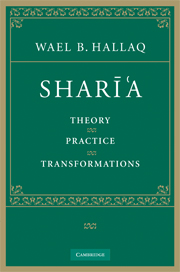Book contents
- Frontmatter
- Contents
- Preface and acknowledgments
- Introduction
- Part I The pre-modern tradition
- 1 The formative period
- 2 Legal theory: epistemology, language and legal reasoning
- 3 Legal education and the politics of law
- 4 Law and society
- 5 The Circle of Justice and later dynasties
- Part II The law: an outline
- Part III The sweep of modernity
- Appendix A Contents of substantive legal works
- Appendix B Chronology
- Bibliography
- Index
1 - The formative period
Published online by Cambridge University Press: 05 June 2012
- Frontmatter
- Contents
- Preface and acknowledgments
- Introduction
- Part I The pre-modern tradition
- 1 The formative period
- 2 Legal theory: epistemology, language and legal reasoning
- 3 Legal education and the politics of law
- 4 Law and society
- 5 The Circle of Justice and later dynasties
- Part II The law: an outline
- Part III The sweep of modernity
- Appendix A Contents of substantive legal works
- Appendix B Chronology
- Bibliography
- Index
Summary
The Near Eastern background
By the time of his death in 11/632, the founder of Islam had left behind a small state in Medina (previously Yathrib) whose ideological props were fiercely uncompromising moral principles fitted into a larger context of tribal justice. With the rapid conquests of lands lying between western China and the Iberian Peninsula, the new religion generated a full-fledged, sophisticated law and legal system in the relatively short span of the three and a half centuries that followed its inception. Our concern in the present chapter and partly the next is to sketch the outlines of this formative development.
Long before Islam appeared on the scene, Mecca and Medina had a long history of settlement and formed part of the cultural continuum that had dominated the Near East for millennia. The two towns were not at the center of imperial culture, but they were tied to it in countless ways. Prior to the Arab expansion in the name of Islam, Arabian society throughout the region had developed the same types of institutions and forms of culture already long established in the lands to the south and north, a development that would later facilitate the Arab conquest of the entirety of that region, including its two major Empires.
In the century or so before the rise of Islam, there existed three centers of empire, the Byzantine (around the eastern Mediterranean coast), the Sasanid (today's eastern Iraq and Persia) and the Yemenite (in the south-east of the Arabian Peninsula itself).
- Type
- Chapter
- Information
- Sharī'aTheory, Practice, Transformations, pp. 27 - 71Publisher: Cambridge University PressPrint publication year: 2009



